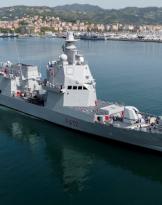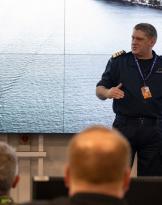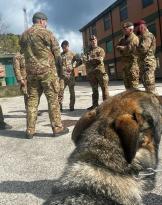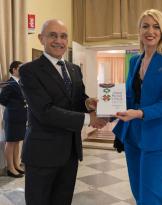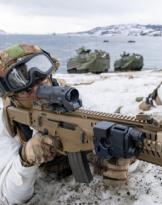The conference for the presentation of historical documentaries, produced by RTV San Marino with the contribution of the Navy's Historical Office, dedicated to the role played by the Armed Force in the First Conflict was held yesterday afternoon at the Historical Library of Palazzo Marina world.
The event, which took place in the presence of the Chief of Defense Staff, General Claudio Graziano, and of the Navy Chief of Staff, Team Admiral Valter Girardelli, saw the participation of the Chiefs of Staff of the other Armed Forces , of the representatives of the General Commands of the Carabinieri and Guardia di Finanza, of the general commander of the Port Authorities and of the military and civil authorities.
The conference was opened by the head of the Navy's Public Information and Communication Office, Rear Admiral Fabio Agostini, and conducted by the well-known journalist Tiberio Timperi who, as moderator, introduced the interventions of the Chief of Defense Staff, the Chief of Defense General Staff of the Navy, of Dr. Carlo Romeo, general manager of San Marino RTV, of the vessel captain Giosué Allegrini, head of the Navy's Historical Office, and of Dr. Enrico Cernuschi, naval historian and author of numerous sector publications.
In his speech, General Graziano wanted to underline that "the lessons learned from history have taught us that it is essential to avoid duplication and pursue interforcing", and that the interventions of the Navy during the Great War, to support operations terrestrial, were the first examples of interforce spirit.
Admiral Girardelli provided a general overview on the activity carried out by the Navy during the Great War, a conflict in which new technologies had a rapid development thanks to the support and foresight of Admiral Thaon di Revel who, as chief of staff of the Navy and commander in chief of the square of Venice, he was able to adapt the aeronaval instrument to the needs of the moment.
 After recalling the great actions, such as the sinking of the battleships Vienna in the port of Trieste, Santo Stefano off the coast of Premuda e Viribus Unitis in the naval base of Pula, Admiral Girardelli recalled the 86.000 war missions, quantifiable in a total of 2 million engine hours and 25 million miles traveled, performed by units of the Navy engaged in surveillance, ambush and escort ; all these activities, which guaranteed Italy the exercise of Maritime Power and, consequently, the favorable outcome of the conflict.
After recalling the great actions, such as the sinking of the battleships Vienna in the port of Trieste, Santo Stefano off the coast of Premuda e Viribus Unitis in the naval base of Pula, Admiral Girardelli recalled the 86.000 war missions, quantifiable in a total of 2 million engine hours and 25 million miles traveled, performed by units of the Navy engaged in surveillance, ambush and escort ; all these activities, which guaranteed Italy the exercise of Maritime Power and, consequently, the favorable outcome of the conflict.
The contents of the documentaries, respectively entitled "Venice the Queen", "Brindisi the Sentinel" and "Rome the Network", were anticipated by Commander Allegrini, who explained the role of these three cities in the maritime conflict.
Doctor Cernuschi finally brought attention to the topic of Maritime Power, underlining the importance, still current, of controlling maritime spaces.
In conclusion, a brief intervention by Dr. Desirée Tommaselli, art historian of the University of Tor Vergata, who highlighted the role of the "embarked painters", real communicators of the maritime war, whose works constitute a valuable nucleus of the Naval History Museum of Venice.
The three documentaries, which are part of the official program of commemorations of the centenary of the First World War, by the presidency of the Council of Ministers - Mission Structure for Anniversaries of National Interest, will go on the air Friday 13 January at 21.10 on RTV San Marino.



